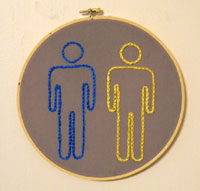Conducted by the Global Forum on MSM & HIV between 24 June and 17 August 2010, the survey sought to highlight key gaps in global efforts to provide MSM with evidence-informed HIV prevention services. More than 1,000 of the study participants - drawn from all over the world - were health workers; 22 percent reported being HIV-positive.
The authors recommend expanding access to HIV prevention services for MSM across the globe, more focus on promoting awareness of emerging HIV prevention interventions and more robust and sustained stigma-reduction efforts. Some of the major findings of the survey include:
Access to health services - Fifty-three percent of participants said they could easily access testing for sexually transmitted infections, while 51 percent said they had easy access to HIV counselling; 47 percent found STI treatment easily accessible.
Just 36 percent of MSM surveyed reported having easy access to HIV treatment, while 27 percent said it was available but difficult to access, was not available or had never heard of HIV treatment.
Access to HIV prevention - Free condoms were easily accessible only to 44 percent of participants, while just 29 percent could obtain lubricant.
Just 30 percent of participants reported easy access to each of the basic HIV prevention services, including behavioural HIV/AIDS interventions, HIV education materials, mental health services, free or low-cost medical care, media campaigns focused on reducing HIV, and laws/policies to ensure access to HIV prevention.
Just 25 percent said they had access to sex education.
Stigma - Africa reported the highest levels of stigma and external homophobia, followed by the Middle East, Asia-Pacific, Central/South America and the Caribbean, which all reported similar levels of stigma. Australia and New Zealand reported the lowest levels of stigma and external homophobia.
MSM from Africa and the Asia-Pacific region reported the highest levels of internalized homophobia.
MSM-specific services - Some 52 percent of respondents reported that MSM health facilities were not available or unknown.
Media campaigns to reduce homophobia were rare, with 30 percent of the survey's participants reporting that anti-homophobia campaigns were not available and another 20 percent saying they were "unheard of".
Knowledge of and access to emerging HIV prevention strategies - Fifty percent of respondents said medical male circumcision was easily accessible and just 10 percent had not heard of circumcision as a biomedical strategy for HIV prevention.
Post-exposure prophylaxis (PEP) was described as easily accessible by only 18 percent of respondents, with 35 percent reporting that they had never heard of PEP.
Thirty-nine percent of participants had never heard of pre-exposure prophylaxis for HIV prevention, while 44 percent of MSM had never heard of topical microbicides.
kr/mw
This article was produced by IRIN News while it was part of the United Nations Office for the Coordination of Humanitarian Affairs. Please send queries on copyright or liability to the UN. For more information: https://shop.un.org/rights-permissions





